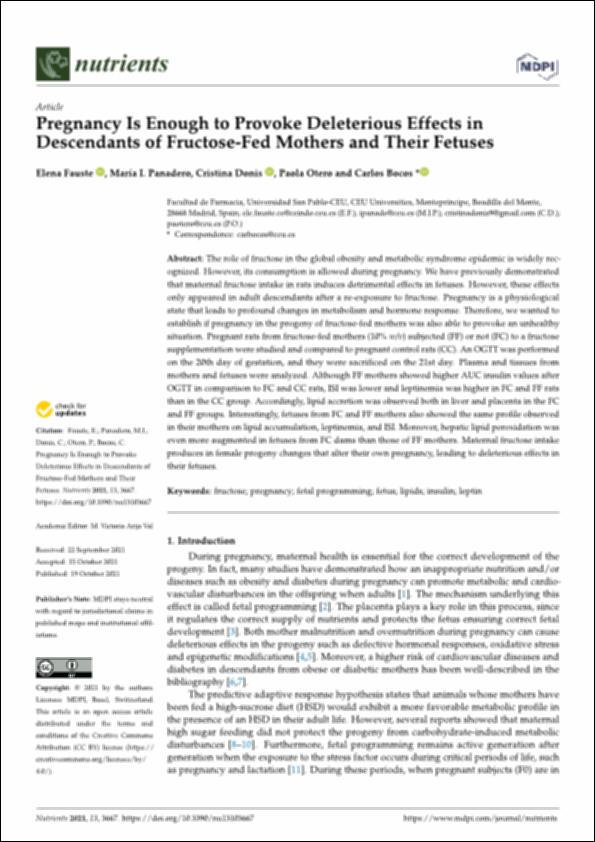Please use this identifier to cite or link to this item:
http://hdl.handle.net/10637/14948Pregnancy Is Enough to Provoke Deleterious Effects in Descendants of Fructose-Fed Mothers and Their Fetuses

See/Open:
Pregnancy_Fauste_et_al_Nutrients_2021.pdf
1,28 MB
Adobe PDF
See/Open:
Dataset Nutrients 2021 E.Fauste.xlsx
29,52 kB
Microsoft Excel XML
See/Open:
Readme Dataset-Nutrients-2021-e.fauste_EN.txt
1014 B
Text
See/Open:
Readme Datos de investigacion-Nutrients-2021-e.fauste_ES.txt
1,02 kB
Text
| Title: | Pregnancy Is Enough to Provoke Deleterious Effects in Descendants of Fructose-Fed Mothers and Their Fetuses |
| Authors : | Fauste Alonso, Elena Panadero Antón, María Isabel Donis Rodríguez, Cristina Otero Gómez, Paola Bocos de Prada, Carlos |
| Keywords: | Fructose; Pregnancy; Fetal programming; Fetus; Lipids; Insulin; Leptin |
| Publisher: | MDPI |
| Citation: | Fauste, E.; Panadero, M.I.; Donis, C.; Otero, P.; Bocos, C. Pregnancy Is Enough to Provoke Deleterious Effects in Descendants of Fructose-Fed Mothers and Their Fetuses. Nutrients 2021, 13, 3667. https://doi.org/10.3390/nu13103667 Fauste, E.; Panadero, M.I.; Donis, C.; Otero, P.; Bocos, C. Pregnancy Is Enough to Provoke Deleterious Effects in Descendants of Fructose-Fed Mothers and Their Fetuses. [Dataset]. Depósito digital en CEU ReI, http://hdl.handle.net/10637/14948 |
| Abstract: | The role of fructose in the global obesity and metabolic syndrome epidemic is widely recognized. However, its consumption is allowed during pregnancy. We have previously demonstrated that maternal fructose intake in rats induces detrimental effects in fetuses. However, these effects only appeared in adult descendants after a re-exposure to fructose. Pregnancy is a physiological state that leads to profound changes in metabolism and hormone response. Therefore, we wanted to establish if pregnancy in the progeny of fructose-fed mothers was also able to provoke an unhealthy situation. Pregnant rats from fructose-fed mothers (10% w/v) subjected (FF) or not (FC) to a fructose supplementation were studied and compared to pregnant control rats (CC). An OGTT was performed on the 20th day of gestation, and they were sacrificed on the 21st day. Plasma and tissues from mothers and fetuses were analyzed. Although FF mothers showed higher AUC insulin values after OGTT in comparison to FC and CC rats, ISI was lower and leptinemia was higher in FC and FF rats than in the CC group. Accordingly, lipid accretion was observed both in liver and placenta in the FC and FF groups. Interestingly, fetuses from FC and FF mothers also showed the same profile observed in their mothers on lipid accumulation, leptinemia, and ISI. Moreover, hepatic lipid peroxidation was even more augmented in fetuses from FC dams than those of FF mothers. Maternal fructose intake produces in female progeny changes that alter their own pregnancy, leading to deleterious effects in their fetuses. |
| Description: | Se adjuntan datos de investigación y fichero Readme.txt |
| URI: | http://hdl.handle.net/10637/14948 |
| Rights : | http://creativecommons.org/licenses/by-nc-nd/4.0/deed.es Open Access |
| ISSN: | 2072-6643 |
| Issue Date: | 19-Oct-2021 |
| Center : | Universidad San Pablo-CEU |
| Appears in Collections: | Facultad de Farmacia |
Items in DSpace are protected by copyright, with all rights reserved, unless otherwise indicated.

